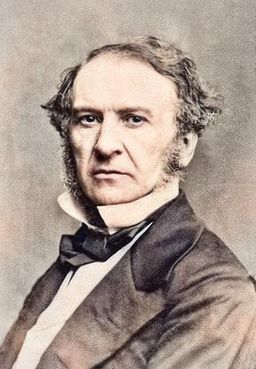
The Grand Old Man
'The People's William'
Gladstone was what we might call a 'household name' in his day. He was admired and respected by every day people for a variety of reasons.
He was responsible for removing tariffs and duties on many products including everyday essentials, thus making life easier and those items more affordable. During his time as Chancellor of the Exchequer he removed tariffs and duties on a large number of products, in 1853 he removed or reduced duties on 250 goods, in 1860 he later went on to remove import tariffs and restrictions on nearly all goods. As a result of these actions, tens of thousands of people lined the bank of the river Tyne when he visited in 1862 and was thereafter known as 'the people's William'.
"When Mr Gladstone visited the North, you well remember when word passed from the newspaper to the workman that it circulated through mines and mills, factories and workshops, and they came out to greet the only British minister who ever gave the English people a right because it was just they should have it ... and when he went down the Tyne, all the country heard how twenty miles of banks were lined with people who came to greet him. Men stood in the blaze of chimneys; the roofs of factories were crowded; colliers came up from the mines; women held up their children on the banks that it might be said in after life that they had seen the Chancellor of the People go by. The river was covered like the land. Every man who could ply an oar pulled up to give Mr Gladstone a cheer. When Lord Palmerston went to Bradford the streets were still, and working men imposed silence upon themselves. When Mr Gladstone appeared on the Tyne he heard cheer no other English minister ever heard ... the people were grateful to him, and rough pitmen who never approached a public man before, pressed round his carriage by thousands ... and thousands of arms were stretched out at once, to shake hands with Mr Gladstone as one of themselves. – George Holyoake 1865"
Based on today's standards these actions may not seem so significant, however in a world that had for centuries been controlled by, and government policies targeted at benefiting, the rich elite, William Gladstone fought for the rights of all men. He introduced important voting rights such as the secret ballot and the right to vote to ordinary working men.
Gladstone said that each life is “as inviolable in the eye of Almighty God as can be your own. Remember that He who has united you together as human beings in the same flesh and blood, has bound you by the law of mutual love; that that mutual love is not limited by the shores of this island, is not limited by the boundaries of Christian civilisation; that it passes over the whole surface of the earth, and embraces the meanest along with the greatest in its unmeasured scope.”
This website is committed to the works and memory of William Gladstone. It is an independent project. © Copyright. All rights reserved.

